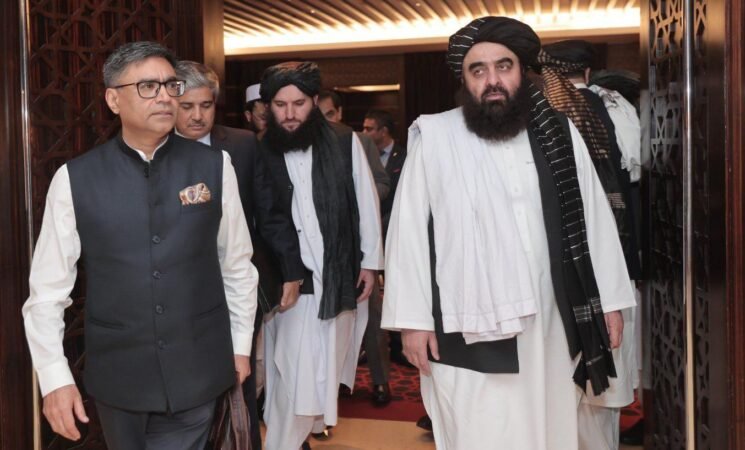18 October 2025, NIICE Commentary 11850
Naziba Mustabshira
In the acrimonious and disorderly field of South Asian geopolitics, India has conventionally perceived itself as the paramount power, pursuing regional domination with a combination of military might, diplomatic influence, and economic leverage. However, recent developments have begun to erode India's long-established position, particularly regarding its rivalry with Pakistan and the shifting developments of Afghanistan. The events as they unfolded indicate India following a high-risk strategy in trying to contain Pakistan and assert its regional leadership with far-reaching implications for the future of South Asia.
India's approach towards Afghanistan has hitherto been one of cautious engagement, with intense focus on developmental aid and diplomatic interaction. This was, of course, prior to the Taliban's return to power in 2021. India's refusal to negotiate with the Taliban, topped with its public condemnation of the group's human rights abuses, was a morally driven and strategically prudent move. But now, by a sudden about-face, India has re-aligned its policy as indicated by the recent Afghan foreign ministerial visit to New Delhi and the announcement of increased diplomatic interaction signifying the start of a new era in Indo-Afghan relations.
This change in India's strategy is because of a plethora of reasons, not the least being Pakistan's growing influence. India has long attempted to diplomatically isolate Pakistan, resisting its efforts to consolidate ties with China and other regional actors. However, Pakistan's strategic maneuvering has increasingly been effective. Its rapprochement with Beijing, its overtures to Washington, and its reassertion of influence in Afghanistan have put India on the back foot. Pakistan is no longer the region's bench warmer; it is back in the game, utilizing its spot on the world stage to recapture its place in South Asia.
India, for its part, is grappling with its own strategic vulnerabilities. Despite its better military, India's inability to finally take over regions like Kashmir and the recent Pahalgam crisis has revealed cracks in its illusion of South Asian hegemony. The aftermath of the Pahalgam assault, in a region which had been under Indian influence for a long time, revealed grave intelligence and military shortcomings and eroded India's image as the unchallenged power in South Asia. With Pakistan increasingly viewed as a regional power and its relationship with Afghanistan strengthening, India has pushed back by hedging its bet on a new alliance with the Taliban.
This new math raises a lot of questions about India's long-term strategic objectives. Is India actually playing Afghanistan as a gambit in a larger policy to check Pakistan's growing influence in the region, or is this simply a desperation play to attempt to reassert control over a coming apart at the seams situation? On the surface, India's move would appear to be a crafty tactical reset, one that attempts to balance Pakistan's gains by brokering negotiations with the Taliban in Kabul. But there is gigantic risk involved in this policy.
First, the Taliban's own regime in Afghanistan is very volatile. To the contrary of promises of stability and non-interference, the Taliban still hosts groups directly threatening India's security, like the Lashkar-e-Taiba (LeT) and Jaish-e-Mohammad (JeM) units. Second, because the Taliban had allied with Pakistan, its commitment to stay within India's interest in the region is questionable. If India keeps bolstering its involvement in Afghanistan, it stands to get involved in a proxy war where it would get more isolated from the international community, particularly the West that remains unconvinced by the Taliban on issues of human rights.
Finally, India's interaction with Afghanistan also takes place when powerful external powers' geo-political interests are coming together in the region. The United States, under Trump, has already made it fairly clear that it is keen on having a military presence again in Afghanistan, and particularly at Bagram Airbase, supposedly to safeguard its own interests in Central Asia and the broader Middle East. With Washington set to return to Kabul, India's strategic calculus could be further complicated by the arrival of an outside power with agendas of its own. Here, India's desire to leverage Afghanistan as a counterweight against Pakistan can easily be outflanked by greater power struggles between international actors, as New Delhi increasingly drifts away from its own interests.
It is not a simple matter to respond to the question of what India stands to gain from this new age of South Asian geopolitics. India's traditional strategy has been to maintain primacy by ensuring that it is the power broker of the region, but the strategy is now facing increased tests in the form of Pakistan's heightened diplomatic and military activism. With Afghanistan again looming large in the region's power politics, India's decision to interact with the Taliban is a reflection of changing strategic priorities. But at its own peril. Will India, in an attempt to outflank Pakistan, find itself getting itself unintentionally drawn into a larger proxy war that is beyond its control? Will this entry into Afghanistan make India more powerful in the realm of Central Asia, or only compound its trouble with the global community?
Afghanistan is, and will continue to be, a powder keg for South Asian geopolitics. India's own position, evident in a desperate bid to regain its hegemony, may prove to be an unsustainable gamble. As Pakistan consolidates its domestic power and continues to advance its ties with United States and China, India's own security position is increasingly precarious. The true question now is whether India's conscious courtship of the Taliban will usher in a broader regional realignment or merely serve to further isolate India from the world, when international cooperation has never been more important. The next installment in South Asian geopolitics is unfolding, and India's installment will be written by the extent to which it succeeds in navigating these ever more complex challenges.
Naziba Mustabshira is a Research Intern at NIICE and also a third-year student in International Relations at the Bangladesh University of Professionals (BUP), Bangladesh.

